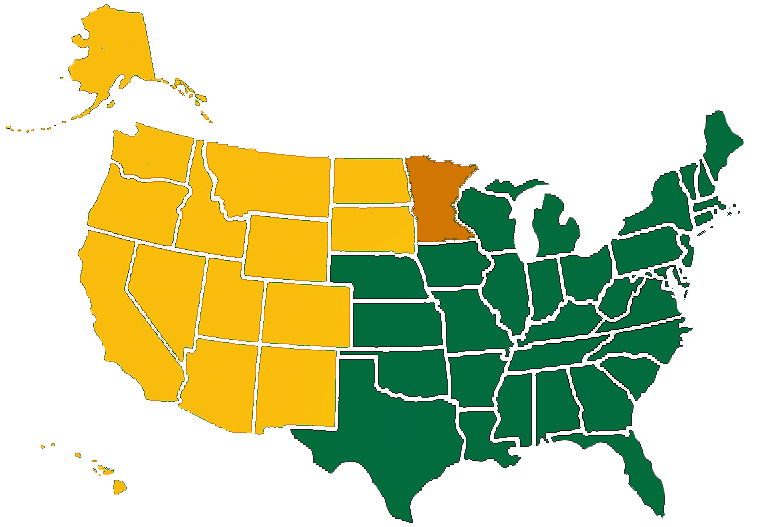Master of Science in Business Analytics
The Master of Science in Business Analytics (MSBA) program at NDSU is a STEM-designated program that will provide you with hands-on training on the business analytics skills, tools, and methodologies you need to transform data into effective decision-making. Most MSBA courses are offered one evening a week in 8-week sessions. Other courses are offered online. The program requires 30 credits for completion. Students can enroll full-time to finish in a year and a half part-time and finish in two or more years.
Accreditation

NDSU's College of Business maintains the highest possible accreditation—a designation reserved for the top 6% of business schools in the world.
Curriculum
The MSBA offers a variety of courses in data analysis, business analytics, advanced analytics, and an in-depth capstone experience.
| MBA 722 Marketing Analytics and Customer Intelligence (2 credits) |
|---|
This course takes a very hands-on approach with customer intelligence and equips students with the marketing science understanding and techniques they need to solve real-world marketing challenges. Thsi course uses a combination of lectures, cases, and exercises to teach the materials. |
| MBA 723 Digital Marketing (2 credits) |
This course focuses on understanding, managing, and analyzing an organization's digital marketing strategy. Topics related to online business models, search engine optimization, paid search and display advertising, web analytics, email marketing, social media marketing, and reputation management will be considered. |
| MBA 751 Business Analytics Concepts (2 credits) |
This course covers important business data analytics concepts, including warehousing, OLAP, ETL, data mining, self-service business intelligence, and business reporting and visualization tools. It provides hands-on experience in the use of some popular data analytics software tools with a focus on aiding managerial decision-making across different business functional areas. |
| MBA 753 Business Analytics Methods (2 credits) |
This managerially-oriented course covers the use of predictive analytic tools to generate predictive models such as logistic regression, decision trees, neural networks, and cluster analysis to generate deeper business insights in direct support of managerial decision making. |
| MIS 710 Database Management (2 credits) |
This course provides a foundational understanding of the management, conceptualization, development, and implementation of databases. It covers normalization, structured query language (SQL), distributed databases, and conceptual modeling using entity-relationship (ER) diagrams. Case examples of modeling data in an organizational context will be utilized. Prereq: Open to MSBA students or with permission of the instructor. |
| MIS 720 Visualization and Reporting (2 credits) |
Provides advanced usage of quantitative analysis using spreadsheets, in-memory database, and development of effective dashboards. Emphasis is on the application of theoretical understanding of the human interaction with the user interface to facilitate communication and story-telling using data. Effectively communicating analysis results to a mangement and business audience using dashboards and reports to enhance decision-making is examined. |
| MIS 740 Advanced Business Analytics Methods (2 credits) |
This course develops an understanding of practical applicability of advanced analytics methods in a variety of business scenarios. The course is designed to provide hands-on opportunities for students to work with data and apply advanced business analytics techniques and machine learning, which include text mining, natural language processing, web analytics, social analytics, and simulation. |
| MIS 760 Business AI (2 credits) |
Explores fundamental business AI concepts and the latest developments. Covers business AI technologies, their applications, and implications. Focuses on AI-driven digital transformation. Develops a holistic, strategic understanding of AI-integrated businesses, products, and services. |
| MIS 790 Seminar in Business Analytics (2 credits) |
Seminar course that examines current topics related to business analytics and how organizations can make use of data for decision-making. |
| STAT 725 Applied Statistics (3 credits) |
Data description, probability, inference on means, proportions, difference of means and proportions, categorical data, regression, analysis of variance, and multiple comparisons. |
| Elective Courses (9 credits) |
In addition to the 21 required core credits listed above, MSBA students must complete a minimum of nine (9) elective credits, as approved by the MSBA program advisor. |
Cost
2024-2025 MSBA Tuition & Fee Costs
Residency | North Dakota + WRGP |
| All Other U.S. | Non-U.S. |
|---|---|---|---|---|
Per Credit | $705.64 | $878.15 | $1025.11 | $1184.84 |
Approximate Program Total | $21,170 | $26,345 | $30,750 | $35,5475 |
Map Key |
|
|
|
|

Various resources may be available to help cover program costs.
Common examples include:
| Employer Support | Scholarships | Graduate Assistantships | Federal Financial Aid (FAFSA) |
|---|---|---|---|
Many companies offer tuition reimbursement or other forms of financial assistance for their employees. Check with your supervisor or HR department top find out what educational benefits you may be eligible to use toward your degree. | A very limited number of scholarships may be available to graduate students. Applications are open from November 1st to March 1st each year for students to apply for awards that would disburse during the following academic year. | Graduate assistantship positions are exceptionally limited and awarded on a competitive, case-by-case basis (if available). Generally, no funding is offered at the time of admission. Current and incoming/admitted MSBA students may be notified if a position becomes available and provided with application information at that time. Students with a graduate assistantship postition will receive a one- or two-semester contract to provide research and/or teaching assistance for 10, 15, or 20 hours per week in exchange for a waiver of the graduate base tuition rate and a modest stipend. | Domestic and permanent resident students may be eligible to receive federal financial aid and/or need-based scholarships by completing the FAFSA. |
Admission Requirements
Applications are reviewed on a case-by-case basis using a rolling admission format. The review process is holistic and takes into account all applicable factors, such as past/current CGPA, professional experience, GMAT/GRE score, statement of purpose, letters of recommendation, etc.
An application file must be completed with all required official documents before it can be reviewed for admission. Admission decisions will not be made based upon incomplete application files and/or unofficial documentation.
In order for an application file to be considered complete, the following items must be received by the Graduate School:
- Online Application
- Statement of Purpose + Resume
- Three (3) Letters of Recommendation
- $35 Application Fee
- Official Transcripts (from all institutions previously attended)
- Official GMAT or GRE score*
- Proof of English Proficiency**
Application Instructions
** Official GMAT or GRE Score
In certain circumstances, applicants may qualify to be considered for a waiver of the GMAT/GRE exam requirement. Typically, the criteria for consideration would be for individuals with five or more years of post-baccalaurate professional career experience and a strong academic background. Applicants who wish to be considered for a GMAT/GRE exam waiver must make this request with the MSBA admission committee.
GMAT/GRE exam waivers are never guaranteed, but rather are considered on a case-by-case basis. Decisions are made at the sole discretion of the MSBA admission committee.
** Proof of English Proficiency
May be met in one or more of three ways:
- Raised in a country in which English is the only official language
- Earned a bachelor's degree or higher from a recognized institution within a country in which English is the only official language; or
- Official English language test score—TOEFL ibt 71 or higher, IELTS academic 6.0 or higher; PTE academic 50 or higher; or Duolingo 100 or higher.
Contact
Connect with us to start a conversation about your interest in the MSBA program.

Elizabeth Worth, MEd
Graduate Programs Coordinator
MSBA Advisor
Dean's Office
Richard H. Barry Hall 104B
Or fill out the form below to let us know you're interested or to request more information about the MSBA program.


